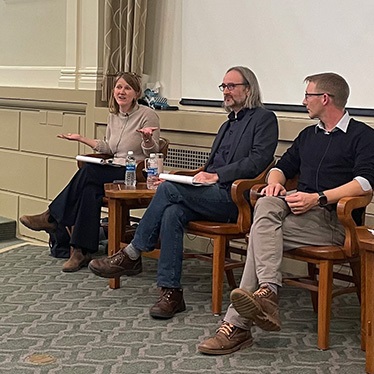Simulation exercise offers a seat at negotiating table
November 12, 2019
 During a recent simulation exercise at Maxwell, graduate
students, including Executive Education and Humphrey Fellows, almost resolved a
fictional conflict in the Jammu-Kashmir region, along the India-Pakistan
border. “They got pretty close, which is really impressive. It only fell apart
in the last half hour,” said Joshua Kennedy, associate director for public administration
and international affairs (PAIA), who has helped coordinate Maxwell’s simulation
for several years.
During a recent simulation exercise at Maxwell, graduate
students, including Executive Education and Humphrey Fellows, almost resolved a
fictional conflict in the Jammu-Kashmir region, along the India-Pakistan
border. “They got pretty close, which is really impressive. It only fell apart
in the last half hour,” said Joshua Kennedy, associate director for public administration
and international affairs (PAIA), who has helped coordinate Maxwell’s simulation
for several years.
Kennedy worked with the U.S. Army War College to present the International Strategic Crisis Negotiation Exercise in the Maxwell-Eggers Complex on October 25 and 26. Thirty Syracuse University participants included Humphrey Fellows, Executive Master of Public Administration students, members of the Defense Comptroller Program (DCP), graduate students in PAIA, and political science and international relations students. Seven SUNY Cortland students also participated.
Organizers placed participants into groups representing different nations attending meetings intended to simulate negotiation skills in a real-world policy challenge. A central lesson was to illustrate the role of negotiation under uncertainty.
It’s no accident the recent simulation focused on a region making international headlines. “Scenarios generally build on international affairs going on for a significant time that could rise to the level of a major international conflagration,” Kennedy explained.
It’s valuable for students to get the perspective from different countries. “We try to have an American think like a Pakistani, an Indian think like he’s from the UK so students can think about the different strategic goals the different countries wanted,” he said.
That approach illustrates “the constraints the other perspectives place on policy outcomes,” he added. “Students learn that your policy is going to be influenced by things far beyond your control.” Even as you negotiate, “You still have other actors who are developing their own initiatives. When you go into one meeting, an external issue you cannot control may have changed.”
The simulation offered a chance to connect theory with practice. “The goal of simulations is to keep the negotiations going and make small incremental wins,” Kennedy said. “There aren’t always huge transformational moments. Sometimes the best solution might be that we agree to another conference.”
Sreeparvathy S. L., a Humphrey Fellow from India, hopes to use similar simulation exercises to teach negotiation skills in the Indian Ministry of Finance. As an Indian national, she would have preferred not to be placed with the Indian team. “I actually wanted to be part of some other team to get another perspective,” she said. “But I really understood how a third party can be given a new orientation on an old issue.”
Cameron Keys, an analyst for the U.S. Army and a DCP student, hoped to learn how diplomatic negotiations work. “I was pleased with the emphasis on process,” he said. “Formal meetings proceeded much the same way actual formal meetings might in a real-world crisis.”
The exercise highlighted the importance of communication and leadership skills, Keys added. “Skilled speakers can control discussion, closing off debate or opening up debate to advance their team’s relative interests,” he said. “Negotiations are extremely vulnerable to circumstance; small events on the ground can have large diplomatic consequences at the negotiating table.”
11/12/19
Related News
School News

Apr 2, 2025
School News

Mar 26, 2025
School News

Mar 24, 2025
School News

Mar 18, 2025